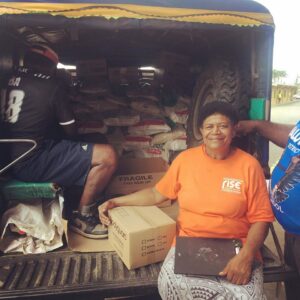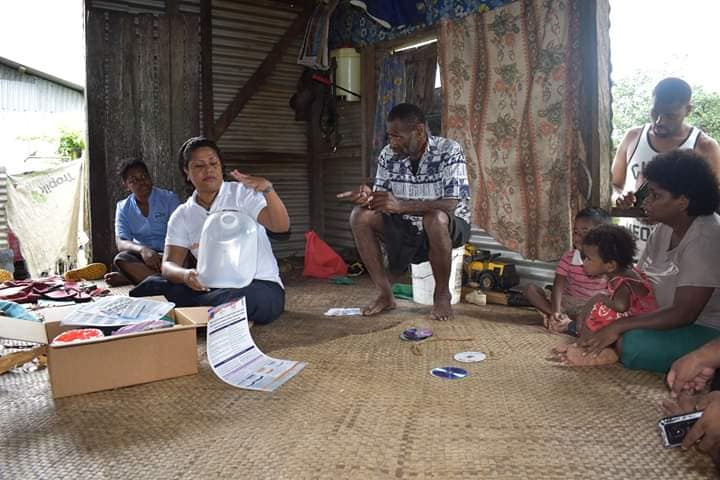Co-responsibility in the face of two crises in Fiji
April 30, 2020

Rise Beyond the Reef providing food ration deliveries to the Ba upper mountain regions where their artisans reside. PC: Rise Beyond the Reef
In the blink of an eye, the world seems so different and unusual to me. I am still coming to terms with COVID-19 and trying to make sense of the discomfort I have been feeling which David Kessler describes as grief. Grieving the loss of normalcy, inter-personal connection and currently living in fear of the uncertainty of the months ahead. While I am hopeful that it’s temporary, I am mindful that I must be prepared to adapt and to find positive coping mechanisms to help me through these tough times.
I draw strength from feminist solidarity which calls for mutual support, collective care, and healing justice. Our resilience as a feminist movement has continued to insist, persist, resist, and exist through the myriad of challenges that we continue to face.
Since the announcement of Fiji’s first COVID 19 case (March 19), women have been at the forefront of COVID-19 related work – taking on critical roles in health services, counselling, fundraising and relief efforts, awareness and information sharing, and the majority of women have taken on three times as much unpaid care and domestic work as men now that children are out of school till June 15. Women’s work is often invisible, under-recognised, and under-valued. Exacerbating the impact of COVID-19, Fiji experienced a category 4 tropical cyclone which caused widespread flooding in low lying areas, damage to properties, one recorded death, and food security issues.
At the Fiji Women’s Fund, we know that this isn’t business as usual. As a women’s fund, now more than ever, we must be empathetic, flexible, and adaptable to support the work of our grantee partners. For over a month, we have checked-in with our grantee partners and discussed ways that we can help them through these tough times. The safety and preparedness of our grantee partners and the communities that they work in is paramount to achieving the transformative gender equality that the Fund has set out to achieve in Fiji. Many grantee partners have put in place contingency plans to adapt to this “new normal” while others have shifted timelines to be implemented later in the year. Our team has also adapted our workplans and even virtually launched our Annual Progress Report due to social gathering restrictions.
In embracing flexibility, I have learned that while it is important to monitor and guide the completion of workplans, that I must also use my heart and good judgment to navigate my decisions and actions in these times. Extending a hand to offer some extra time and non-monetary support to my work colleagues, grantee partners, family members, and friends, some comfort to the grief this pandemic has brought, some changes to the plans we had made or just a kind note or phone call to hear how they are doing.
In the past five weeks, our grantee partners have contributed towards the disaster relief efforts and in combating and drawing awareness to pre-existing inequalities especially for women, LGBTQI communities and for the inclusion of those living with disabilities.
For instance:
- Medical Services Pacific (MSP) continues to run their 24-hour post-rape and sexual reproductive health rights clinics around the country and simultaneously operating the Ministry of Women, Children and Poverty Alleviation’s child helpline. MSP has been working closely with the Fiji Police Force to identify and report cases of sexual violence, provide psycho-social and trauma counselling support to survivors. MSP has also been on the ground delivering urgent rations and dignity kits (hygiene products) to communities affected by both COVID-19 lock-down and TC Harold. These kits are depleting quickly as MSP has been distributing them over the past month back to back to communities. MSP’s counsellors have been deployed for the next seven weeks to affected communities in Tailevu, Rewa and Naitasiri that were badly destroyed by TC Harold. They will be providing psycho-social support to communities in these areas in partnership with the Commissioner Central’s DISMAC team and the Australian Government.
- Fiji Women’s Rights Movement has been closely monitoring COVID-19 and working overtime as the Chair and Secretariat of the Fiji NGO Coalition on Human Rights to highlight key human rights concerns that have emerged during this crisis. The NGOCHR has released five statements to urge the government to adopt a human-rights based approach in its COVID-19 response. These releases called for the Fijian Government and authorities to prioritise the safety of women and girls under lock-down who may be survivors of violence.
- Fiji Disabled People’s Federation has been a pillar of strength in ensuring crucial national information and services during the COVID 19 crisis and TC Harold includes the myriad needs of people with disabilities. Daily, Fijians have seen FDPF members on their television screens, providing sign language interpretation for the Fijian Government. The Federation is also supporting the development of a new mobile application for rapid information sharing and has been assisting with food and emergency supply rations. The Federation also called for respect and understanding after receiving some bullying from members of the public in relation to their sign interpretation.
- femLINKpacific through their various communications platforms continues to play an important role in amplifying the voices of rural women in times of disaster and ensuring that rural and remote communities can access information and to react quickly. Their broadcasts also featured personal experiences of sex workers who are members of the Pacific Rainbow Advocacy Network (PRAN). PRAN has been advocating against the increased stigma faced by its members since the lockdown in Lautoka. PRAN also coordinated the dissemination of timely information, finding shelter for homeless members and food as many member’s sources of income had been affected by the movement restrictions.
- Rise Beyond the Reef (RBTR) continues to make their special trips to deliver essential food rations to rural remote women artisans. Despite the significant impact the pandemic has had on the tourism industry, RBTR has maintained its commitment to buying crafts from the women so that their livelihoods are unaffected. RBTR is entering into phase two of their work with upper mountain Ba partner communities, following rations and seed distribution to establish village-based “farm food banks”. A communal space to raise seedlings and mass propagate a diverse range of root and vegetable crops for consumption.
- Women Entrepreneurs and Business Council recognised the difficulties most women involved in small and medium enterprises are facing and are providing virtual learning spaces to members such as training, advice and coping as a business. The Council has also provided legal support to its members about employment policies such as redundancy and how to comply with labour laws.
In my role at the Fund, I couldn’t be prouder of the work of these fierce and bold women continue to do in the face of adversity and I stand with them in solidarity – recognising that for their work to continue, we must share workloads, identify coping mechanisms, encourage the sharing of ideas, learnings and most importantly financial and non-financial resources. While we may never fully return to that normalcy that we desperately crave, we can collectively support all efforts that push for the betterment of women in Fiji.
If you are keen to support the work of the Fiji Women’s Fund and our grantee partners, please reach out through email on: information@womensfund.org.fj
The Fiji Women’s Fund (the Fund) is an initiative of the Australian Government’s Pacific Women Shaping Pacific Development (Pacific Women) Program. The Fund has committed AU$10.5 million from 2017 to 2022 for funding and capacity development support to women’s groups, networks, and organisations in Fiji to expand and enhance their work on women’s empowerment and gender equality.

MSP distributing dignity kits (hygiene products) to communities affected by COVID-19 and TC Harold. PC: MSP
About the Author
Menka Goundan is feminist activist and has worked in research, advocacy and training in women’s human rights in Fiji and the Pacific. She has previously worked with the Pacific Centre for Peacebuilding and Fiji Women’s Rights Movement. Menka is the outgoing Secretary for the NGO Coalition on Human Rights in Fiji and is also a member of the Program Advisory Committee of the Asian-Pacific Resource and Research Centre for Women (ARROW).
Recent Whats New
WFF Visit to “Rise Beyond the Reef”
December 12 2023
LifeBread Confident Woman Program Graduation
December 12 2023

Leave a Reply